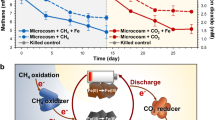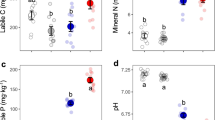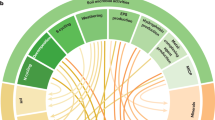Abstract
WHEN working with homogenates of Acacia georginae in an attempt to trace the pathway of fluoroacetate synthesis, we found that there was a loss of fluoride, and we extended our experiments to some other plants to study this effect. This communication describes experiments which have led us to believe that plants can convert fluoride, possibly in part, to a volatile form.
This is a preview of subscription content, access via your institution
Access options
Subscribe to this journal
Receive 51 print issues and online access
$199.00 per year
only $3.90 per issue
Buy this article
- Purchase on Springer Link
- Instant access to full article PDF
Prices may be subject to local taxes which are calculated during checkout
Similar content being viewed by others
References
Peters, R. A., Shorthouse, M., and Ward, P. F. V., Life Sci., 4, 749 (1965).
Hall, R. J., Analyst, 88, 76 (1963).
Peters, R. A., and Shorthouse, M., Life Sci., 6, 1565 (1967).
Lester, D., and Greenberg, L. A., Arch. Industr. Hyg., 2, 335 (1950).
Limperos, G., quoted by Wesley Clayton, jun., J., in Heffter-Heubner Handbook of Experimental Pharmacology (edit. by Smith, F. A.), 20/1, 489 (Springer-Verlag, 1966).
Author information
Authors and Affiliations
Rights and permissions
About this article
Cite this article
PETERS, R., SHORTHOUSE, M. Observations on the Metabolism of Fluoride in Acacia georginae and Some Other Plants. Nature 216, 80–81 (1967). https://doi.org/10.1038/216080a0
Received:
Issue Date:
DOI: https://doi.org/10.1038/216080a0
Comments
By submitting a comment you agree to abide by our Terms and Community Guidelines. If you find something abusive or that does not comply with our terms or guidelines please flag it as inappropriate.



